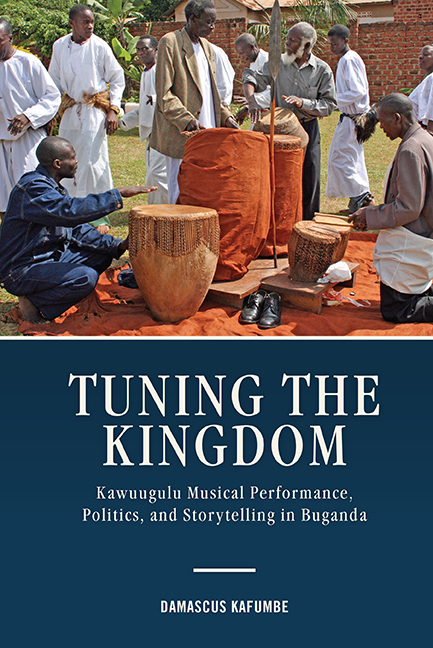Book contents
- Frontmatter
- Dedication
- Contents
- List of Illustrations
- Acknowledgments
- Note on Translation, Transliteration, and Orthography
- Note on the Musical Examples
- Preface: A Kingdom in and out of Tune
- Introduction: Kawuugulu Musical Performance, Politics, and Storytelling
- 1 The Kawuugulu Clan-Royal Music and Dance Ensemble
- 2 Kawuugulu and Intra-Clan Politics
- 3 Kawuugulu and Royal Politics
- 4 Kawuugulu and Inter-Clan Politics
- 5 Conclusion: A Performative Constitution
- Appendix A Glossary
- Appendix B Author Interviews
- Notes
- Works Cited
- Index
2 - Kawuugulu and Intra-Clan Politics
Published online by Cambridge University Press: 09 June 2021
- Frontmatter
- Dedication
- Contents
- List of Illustrations
- Acknowledgments
- Note on Translation, Transliteration, and Orthography
- Note on the Musical Examples
- Preface: A Kingdom in and out of Tune
- Introduction: Kawuugulu Musical Performance, Politics, and Storytelling
- 1 The Kawuugulu Clan-Royal Music and Dance Ensemble
- 2 Kawuugulu and Intra-Clan Politics
- 3 Kawuugulu and Royal Politics
- 4 Kawuugulu and Inter-Clan Politics
- 5 Conclusion: A Performative Constitution
- Appendix A Glossary
- Appendix B Author Interviews
- Notes
- Works Cited
- Index
Summary
Many Aboobutiko consider Kawuugulu as their twin or double, their mulongo, regarding refusal to participate in the ensemble's events as equivalent to disowning the Butiko Clan. To some of these individuals, participation in Kawuugulu events is comparable to birth into the clan and is a confirmation of clan membership, Aboobutiko's identity, and knowledge of the clan's history and practices. To others, the ensemble's instrumental set can punish them if they attend its events and decline to perform with it without a good reason, such as poor health. Punishment for disrespectful behavior can manifest in various ways; some Aboobutiko attest to becoming unsuccessful in their endeavors or subsequently experiencing health problems of some sort. Whatever their social rank, those who attend Kawuugulu events strive to participate in the ensemble's musical performances, formally or informally.
Yozefiina Nakitto, a Ngeye (Colobus Monkey) Clan member born in 1929, recounted that during a performance that facilitated the final funeral rites of a deceased ensemble member in the early 2000s, a Catholic priest took off his robes after leading a Holy Mass and obligingly joined official ensemble members in dancing around Kawuugulu drums. Being a primary member of the Butiko Clan, the priest feared that something bad might happen to him if he refrained from performing. His participation surprised people who expected him to shun Kawuugulu and its practices based on his religious work. The priest's involvement in turn inspired many eligible dancers to get up and dance as well.
This chapter examines how Kawuugulu musical performance and storytelling are inseparable from political life within the Butiko Clan. Focusing on how the ensemble's principal drums, Kawuugulu and Kasajja, embody, structure, and model this principle of interconnectivity in multiple ways, I argue that different practices associated with these drums help bring various contrasting domains together in a sort of cosmic intersection, allowing Kawuugulu to act as a system of intra-clan politics.
The Origins of Kawuugulu and the Butiko Clan
Existing narratives about Kawuugulu, mostly documented by non-Aboobutiko, indicate that the ensemble emerged when the Butiko Clan made the Nyamitongo royal drums for Ssekabaka Mulondo (r. ca. 1524–54). However, according to the accounts of many Aboobutiko, the emergence of the ensemble was an extension of an already-existing musical practice that involved the Kawuugulu and Kasajja drums.
- Type
- Chapter
- Information
- Tuning the KingdomKawuugulu Musical Performance, Politics, and Storytelling in Buganda, pp. 43 - 60Publisher: Boydell & BrewerPrint publication year: 2018

